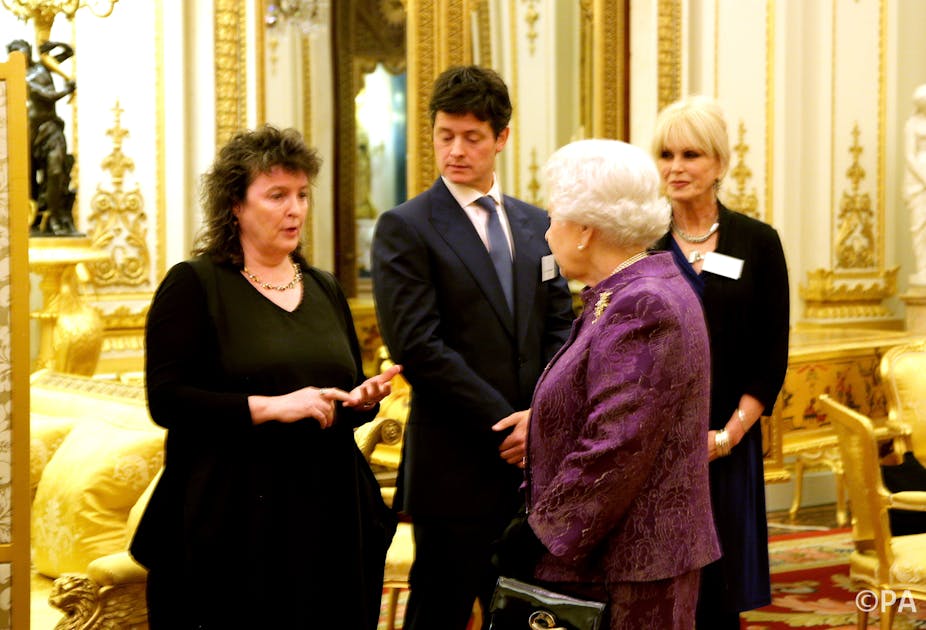Poetry for the Palace, an exhibition at Edinburgh’s Holyrood House, has been timed (its website proclaims) to mark the halfway point of Carol Ann Duffy’s laureateship. The exhibition places the openly gay Mancunian – the first woman to be recognised in the post’s 400-year history – in uncomfortable company: Dryden, Tennyson, Alfred Austin, John Betjeman, for heaven’s sake. A less clubbable, less appealing literary gathering I can scarcely imagine. But that’s the accolade’s weird elitism for you.
Cherishing the freedom of creative expression as energetically as she does, I’ve never understood how the sharp-eyed, supple-tongued Duffy could countenance joining our oh-so-21st-century Royal Household. She accepted, she said at the time, “purely because they hadn’t had a woman … I look on it as recognition of the great women poets we now have writing”. It’s laudable logic; the exhibition endorses her, after all.
A public platform
If it grates, the Laureate’s title commemorates poetry’s age-old cultural-political punch. The leafy symbols of ancient imperial power confirm the political value of creative expression from time immemorial. Emperors, kings; most kinds of decision-makers kept their poets – often also musicians – close at hand, to record and represent deeds and decisions, in and outside the court, much as a PR office does today. A medieval variant on the Twitter feed.
Patronage brings influence but, for articulate sorts inclined to truth-telling, courtly life always had its risks. It was poets that Plato wanted to ban from his Republic. This is because, as any decent poet knows, you can’t tell good poems what to do. Language is always as capable of toxicity as magic.
By definition, the Laureateship makes its holder visible. The post brings with it publicity otherwise impossible to generate. Duffy and her predecessor Andrew Motion have proved that a platform conventionally deployed to laud Royal goings-on – even (albeit unhappily) by as independent-minded a writer as the late Ted Hughes – can be put to more useful ends.
It was Motion who arranged, on his own appointment in 1999, to remake a life-long role into a ten-year post, with an annual stipend of £5,000. He went on to distance himself from the “court” in the course of his tenure (which, famously, he said induced writer’s block) by writing for the TUC, the Salvation Army, Childline and Combat Stress; he also protested against the invasion of Iraq in 2003. If there were dutiful offerings for the Windsor family album along the way, we also have Motion to thank for the founding and funding of that online treasure-chest, the Poetry Archive.
Duffy marked her own appointment by using her honorarium to inaugurate a new poetry prize. Topics to catch her eye have included parliamentary expenses, Afghanistan, the banking crisis and the Icelandic dust-cloud. Vigil commemorates LGBT victims of HIV/AIDS.
Insisting that nobody has ever told her what to write, Duffy has produced the odd occasional poem: The Crown marks the 60th anniversary of the Coronation; Rings, co-authored with textual artist Stephen Raw, the 2011 wedding of Prince William and Kate Middleton. Interestingly, the birth of their son met with silence. More recently, Duffy’s anti-establishment leanings were bitingly confirmed in 22 Reasons for the Bedroom Tax.
Poet as outsider
The fact is, poets don’t make good insiders. Of any establishment. Why don’t we re-engineer, and rename, this imperialist leftover? It’s not only the ridiculous title, with its cap-doffing associates (Master of the Queen’s Music, Master of the Horse, Astronomer Royal). It’s also the invidiousness of the post: much as I love poetry, where are the Artist, Novelist or Dramatist Laureates? More specifically, why merely one voice, among so many deserving ones?
But above all the Laureateship undermines creative independence. Threatens that counter-cultural heritage which is above all the poet’s special legacy: the ability to speak truth, at unwelcome times or in inhospitable places, to power. Besides a plainly dispensable stipend, to a reader like me that benighted title will always condemn, in a single word, as much as it enfranchises.
A shorter period of tenure would help. A life, even a decade, is an inflexibly long time. The Scots Makar, Scotland’s National Poet, is a five-year post; Wales’ National Poet should enjoy no more than a year (although Gillian Clarke has been in post since 2008, without mention of replacement).
Despite the exemplary contrariness of Duffy’s Laureateship, I’m not sure I’ll ever know how to compute “Poet Laureate”, whatever the incumbent’s gender. If it gets poetry more limelight, there are surely less strange, less compromising ways of affording its finest practitioners, women or men, the cultural recognition they deserve. Time to move with the times, yer Maj.

